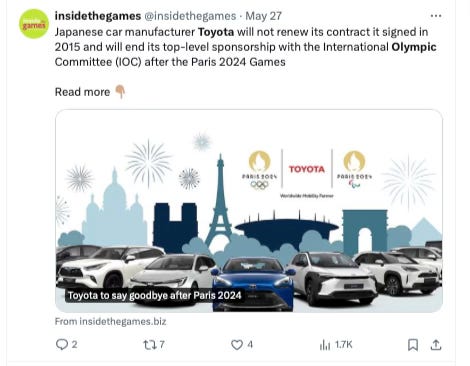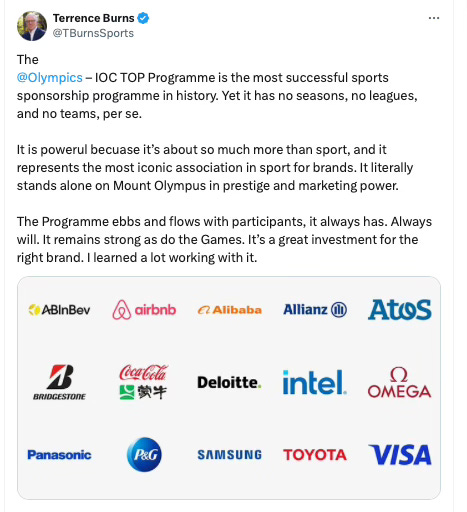What will hurt most when it goes; Prisoners of geography; Sport by McKinsey; Coe ain't running; WSL Catch-22; Women are the new Web3; Toyota TOP exodus is old news; In-house/outhouse; BYD for IOC
Overthinking the sports business, for money
What will you miss most?
A question I sometimes ask is, what will hurt you the most when it’s gone?
In this week’s Wedge Issues, I asked Iain Carter which golfer’s LIV defection hurt most? We agreed on Cam Smith.
Previously I asked Roger Mitchell a similar question: which event or format will you miss when it’s gone? We agreed on test cricket.
All three of us - me, Roger and Iain - are united in our worry about the impact of the market on the Ryder Cup, something which can appear robust but which the market could easily ruin.
Like me, quite a bit of what you probably like about sport is stuff that wouldn’t get pitched to a sovereign wealth fund or private equity group today.
The British Lions? Ryder Cup? Test cricket?
You’ll have your own list.
Historical anomalies that fail the Sport by McKinsey test, which desires straight lines, easily followed narratives, global over local.
What will you miss most is a useful question when applied at the team or club level.
Bath Netball has done everything right - developed a five-time league winning team and an avid local audience of superfans.
But they’ve been dumped from Netball’s Superleague.
Their crime is that they’ve been successful in the wrong place - or to borrow Ebru Koksal’s great phrase, they are ‘Prisoners of geography’.
I live in Brighton, Sussex. My nearest Hundred franchise is in London, where there are two.
According to Andrew Umbers, the Lords and Oval teams will top the market (£50m+ each) in the current Hundred franchise sell off, because Reliance and the Ambani family covet London homes for their IPL brand extensions.
Meanwhile, Ealing Trailfinders don’t play in the Rugby Premiership despite previously winning promotion.
But Ealing is in west London, which is full of rugby clubs. And like Bath’s netball team, the ground doesn’t fit the aspiration of the league. So it’s a no.
The market is an amoral and blunt instrument.
It creates what my old Economics teacher called ‘negative externalities’. A nice phrase for collateral damage.
Then, one day, you turn around and the thing you love is gone, or damaged, or suddenly shows signs of irretrievable neglect.
Michael Henderson’s book on cricket is good when describing this mismatch of sport and the market, this time in relation to The Hundred:
For the first time in the history of professional sport, a game is being changed by the people who run it for the notional benefit of those who are not interested.
Meanwhile, those odd people who do love the game, and cannot understand that necessity, are painted as reactionaries.
Philip Larkin had it right:
Most things are never meant.
This won't be, most likely; but greeds
And garbage are too thick-strewn
To be swept up now, or invent
Excuses that make them all needs.
‘Excuses that make them all needs’.
What a great phrase, capturing that constant pushing to add jeopardy and urgency to impel movement.
Women are the new Web3
There’s a raft of new women focused services popping up across the sports sector.
This trend runs from finance - Mercury13 is just one of a host new women-only multi club ownership investment vehicles seeking to buy clubs or parts of clubs.
Sports marketing and PR agencies are playing a similar game with several opening up women’s sport specialisms under the agency roof.
Questions await.
Why does women’s sport need a differentiated service? (Or are you creating a ghetto?)
Is there enough money in the market to sustain this level of specialisation.
The other bit is more granular, which is the signal and noise question, is a new women’s section a genuine specialism or just a different front door?
We’ll do a podcast on this soon.
Same or different
While we’re on women’s multi club…there’s a Catch-22 for the women’s game as regards the football regulator.
The FA’s former director of the national game Kelly Simmons, has written a really good piece on the realpolitik.
I’ve heard various reasons as to why the women’s game was excluded; from not wanting to add another layer of complexity into the mix and risk stalling the bill, through to giving the women’s game a chance to self-regulate and not wanting to stifle new investment opportunities available to it. But this feels to me like a huge, missed opportunity for the women’s game.
As Kelly points out, the WSL is now pretty much made up of Premier League clubs. But only the men’s side is being thought about with any seriousness.
if the women’s game was to receive a share of these distributions, alongside its own commercial growth, it would absolutely make sense to adopt best practice in cost controls with robust and independent financial regulation, monitoring and reporting to ensure that we do indeed learn the lessons from the men’s game – which many, including me, feel is vitally important. Instead, the women’s game has been given a chance “to regulate itself”, even though 22 of the 24 clubs in NewCo are the very same owners that the government has decided cannot regulate themselves and require independent regulation.
That’s some catch, that Catch-22.
See also:
As UP’s Matt Cutler points out, Notts Forest are backing a netball team over their own women’s football team.
in-house / outhouse / shithouse
Jack Buckner has put UK Athletics events business out to London Marathon and The Great North Run.
This was how things were a decade ago, when Fast Track (aka CSM, now Wasserman) did that job.
UKA took it back in house in the run up to London’s hosting of the World Athletics Championships in 2017.
Then last year, they managed to lose money on a sell-out Diamond League event, which takes some doing.
So, the cycle continues and the work is outsourced again.
The argument is about the location of expertise and contacts, but mainly about money, which is often presented via the analogy of pies.
A smaller pie vs bigger slices of bigger pies etc etc.
The media rights market follows similar cycles.
This week Bundesliga put their rights out to Infront.
This was called early in the latest episode of The Bundle, where we talked about that bit of the agency market, and how it’s changing.
Whisper it, Coe ain’t running
UP sources tell me Lord Coe has decided not to run for the IOC presidency.
If true, it spoils a narrative that’s been picking up steam.
Coe sells CSM to Wasserman, to free himself of conflict of interest ahead of IOC run.
Coe throws the payment for medals bomb in to the IOC as a pre-election trick, building his pro-athlete constituency.
Coe and Wasserman look to rebuild the IOC post-LA26.
Bach moves to block a Coe bid in favour of his own preferred candidate, Kirsty Coventry.
Back seeks to extend term limit to time out Coe and give Coventry more time to build a credible leadership run.
Did I miss anything?
Bach might be saved a Coe election campaign.
But having him on the outside brings its own problems.
Coe feels like he’d be a troublesome enemy when freed of the ambition to stand for office.
One to watch.
Meanwhile, a story I told you over a year ago has this week been announced as breaking news.
For my piece, see the UP Newsletter in April 2023: The Four TOPs
A big brand leaving the TOP programme puts the IOC and its sports industry acolytes on attack mode.
There’s a cottage industry that’s grown fat off the TOPs and any suggestion of its impending obsolescence brings all the boys to the yard.
Terrence will hate Leo Lewis’ piece in the FT.
The problem, says one senior advertising executive who has worked closely with several top-tier Olympic sponsors, is that the fragmentation of media consumption and the ever bigger offerings of live sport and other content mean that viewers do not feel as connected to the games as they used to. The difficulty for a sponsor is that, while there may indeed be millions watching the pole vaulting, and by extension the sponsor’s brand in the background, millions more — the next generation of potential Toyota owners, for example — are watching the pole vaulter’s unbranded TikTok video of what they had for breakfast.
Note: to the FT piece quoted above, TOP brands aren’t even seen ‘in the background’ of the pole vaulting due to IOC clean stadia rules, the removal of which incidentally, were discussed at the Lausanne meeting referenced in my original story linked above.
Where’s it going?
The competition around the TOP auto category is worth keeping tabs on.
Two words, China and Electric.
Toyota’s exit leaves the IOC to sell the category to BYD, Nio or a.other of the mega Chinese electric car brands seeking to define the next generation of cars.
The cost of entry in to the IOC’s walled garden will be eye-wateringly high.
Apropos of nothing
Q. Should managers wear suit and tie to finals?
Q. Name the gaffer









